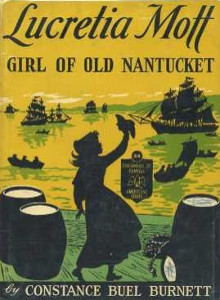Lucretia Mott: Girl of Old Nantucket

Author:
Constance Buel Burnett
Illustrator:
Sandra James
Publication:
1951 by Bobbs-Merrill Company
Genre:
Biography, Non-fiction
Series:
Childhood of Famous Americans (Social and Civic Leaders)
Series Number: 44
Pages:
192
Current state:
This book has been evaluated and information added. It has not been read and content considerations may not be complete.
Book Guide
Search for this book used on:
"Thee has a bold tongue, Lucretia!"
How often the little girl had heard those words! It was true that she sometimes talked back to the deaf Widow Mitchell, to the bad Indian boys, to the Quaker minister, even to her older brother and sister. That was a disgraceful thing for a little Quaker girl in 1800 to do. Quaker girls should be meek and demure. But if people weren't fair, Lucretia felt such a terrible indignation inside her that she couldn't keep still. And she wasn't ever afraid to speak out.
Lucretia lived on the small sandy island of Nantucket, far out in the Atlantic Ocean. Most Nantucket children were fearless. They learned early to take care of themselves, to act quickly when disasters of weather or fire struck. Their fathers were usually away at sea. Their mothers were busy with men's work as well as household tasks. The children just had to be brave and independent.
Lucretia loved her island and the village of Nantucket, with its busy, interesting docks, its gray-shingled houses, its harbor where sea birds wheeled and dived. It was pleasant to live there—to help Mother keep her little shop, to go to the Quaker school and learn all kinds of things, to listen to the talk when the sea captains came home, to enjoy the veal feasts and the great island sheep-shearing celebrations. And what special fun it was when Father returned from a long voyage, bringing presents from far-off corners of the world! What nicer place than Nantucket could there be to live in? Lucretia would have hated to go to the "Continent," as they called the mainland.
Of course a day came when Lucretia had to leave her island. Many interesting experiences happened to her in Boston and Philadelphia. But alway she felt that Nantucket was her real home. And always, everywhere, people were to say that Lucretia had courage and a bold tongue. All her life, when she saw injustice, Lucretia had to speak out against it. She wanted so much to relieve mankind's wrongs, to help people to happiness and peace! And she did prove that brave women could work as usefully as men for the rights of all people oppressed by reason of sex or race or social injury. The independent little Quaker girl of Nantucket became one of the famous women of the nineteenth century—a fearless champion of human rights.
This is an unusual and rewarding addition to the Childhood of Famous Americans series. Little girls today will enjoy its well-told story, its different and picturesque background. Constance Buel Burnett, a well-known writer of juvenile biography, presents Lucretia Mott with sympathetic understanding of her strong and appealing character.
From the dust jacket
To view an example page please sign in.


